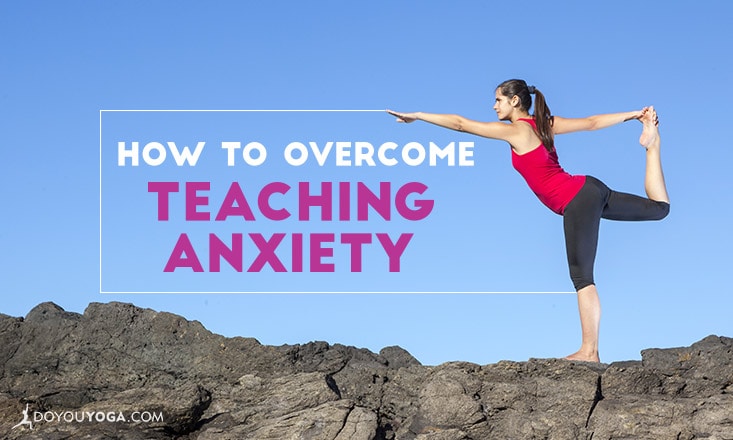I’m sitting in silent prayer. My clammy palms glued together to hide the fact my heart is pounding hard in my chest. My breath is ragged as I try to clear my arid throat. I let out a low, deep Om and hope my students don’t notice I’m fighting the temptation to scream Aarrrrrggh! instead.
I know I’m meant to say something insightful, soothing and profound as 25 pairs of expectant eyes settle upon me but my mind is completely blank.
I search my memory for the inspiration I’d jotted down earlier today when I put the finishing touches to carefully considered lesson plans. Plans I have no recollection of now. I’ve been teaching for 6 years but before every new class, every new retreat I get a little twitchy – consumed with self doubt and nerves.
Fear creeps in that I don’t have the skill, knowledge or sensitivity to choreograph an experience that will be helpful, healing and bring harmony to those seeking solace in Samadhi.
Performance Anxiety in Yoga Teachers
Performance anxiety is a natural part of any creative process but whether it’s a tangled mass of butterflies in your belly, sweaty palms, or the inability to think straight, it can have devastating impact on your ability to teach. After all, so much of our heart and soul goes into what you have to offer.
The trouble with teaching yoga is that you can never anticipate who you’re going to meet on the mat or what they’ll need most. It is impossible to predict how things might unfold. The truth is, no matter how much you plan, there comes a point that you have to let go — let the yoga flow and trust that you know enough to reach people, to teach people.
It is the ultimate practice; surrendering to your insecurity, feeling your fear and allowing yourself to be open to whatever comes, so you can respond accordingly. Here are a few tips and tricks to help you embrace your fears, calm your nerves and keep teaching anyway.
1. Consider what is knocking your confidence.
Consider what is knocking your confidence and more importantly, how to address it. It is often a fear of judgment that kills us most, so ditch the self doubt for starters.
Accept where you are as a teacher and believe in your own ability. If you feel like you’re lacking skill or insight, work on it; practice, study, train. Teaching yoga is a journey that is never complete — we are all still learning, always.
2. Introduce an anchor.
Consider introducing a pre-class ritual that will sooth your nerves. When performance anxiety kicks in, take a deep breath and call upon an anchor. Your anchor can be a song or a mantra that you listen to or repeat when you are feeling overwhelmed that will help get in the right head-space.
Muhammad Ali used to say over and over ‘I am the greatest, I AM the greatest. Ain’t no-one better than me’ before every fight.
3. Plan a little, then let go.
When planning classes or retreats, consider your key messages and the main area of focus. What is it that ties everything together into a seamless experience? What are the most important thing/s you’d most like students to take away today?
Write down peak poses and the wisdom you want to impart, then allow a little space for things to change so you can tailor it to the people standing in front of you.
4. “Practice and all is coming.”
Teaching, like everything else, takes practice and discipline. Sometimes it will go well, sometimes it will not. Keep going! You learn to teach by teaching. Practicing teaching yoga will only ever make you a better yoga teacher. Start small and keep it simple, over time you will evolve into the kind of teacher you aspire to become.
5. Don’t draw comparisons.
Don’t be afraid to shine! We are all different, our teaching style is shaped by our own unique life experience. Share it. Don’t try to imitate your favourite teacher or force yourself to teach in a certain way because you think people will like you better.
“Be yourself because everyone else is taken.” ~Oscar Wilde
Teaching yoga isn’t a popularity contest. Some people will love you, others less so. Given time you will attract your tribe.
6. Don’t limit yourself with your own subjective opinion.
You can never experience yourself as a teacher, so audio or video record yourself teaching! Play it back, cringe and refine the parts you like less. You may also like to consider asking students for feedback to give you some insights into what you do well and where there is room for improvement.
7. Stay humble to the tradition.
You are responsible for passing on the teaching of a 5000-year tradition, respect it. Don’t try to do anything too new or funky, it isn’t necessary.
8. Let your own practice inform your teaching.
You learn a lot about yoga from just doing it. Even if you’re teaching a lot, try not to let anything get in the way of your own practice — in time it will reveal everything you need to know.
Finally, remember that wherever you are in the yoga teacher journey you will have something to teach someone. Enjoy the process of becoming for comfortable and confident with what you have to offer as a teacher.


